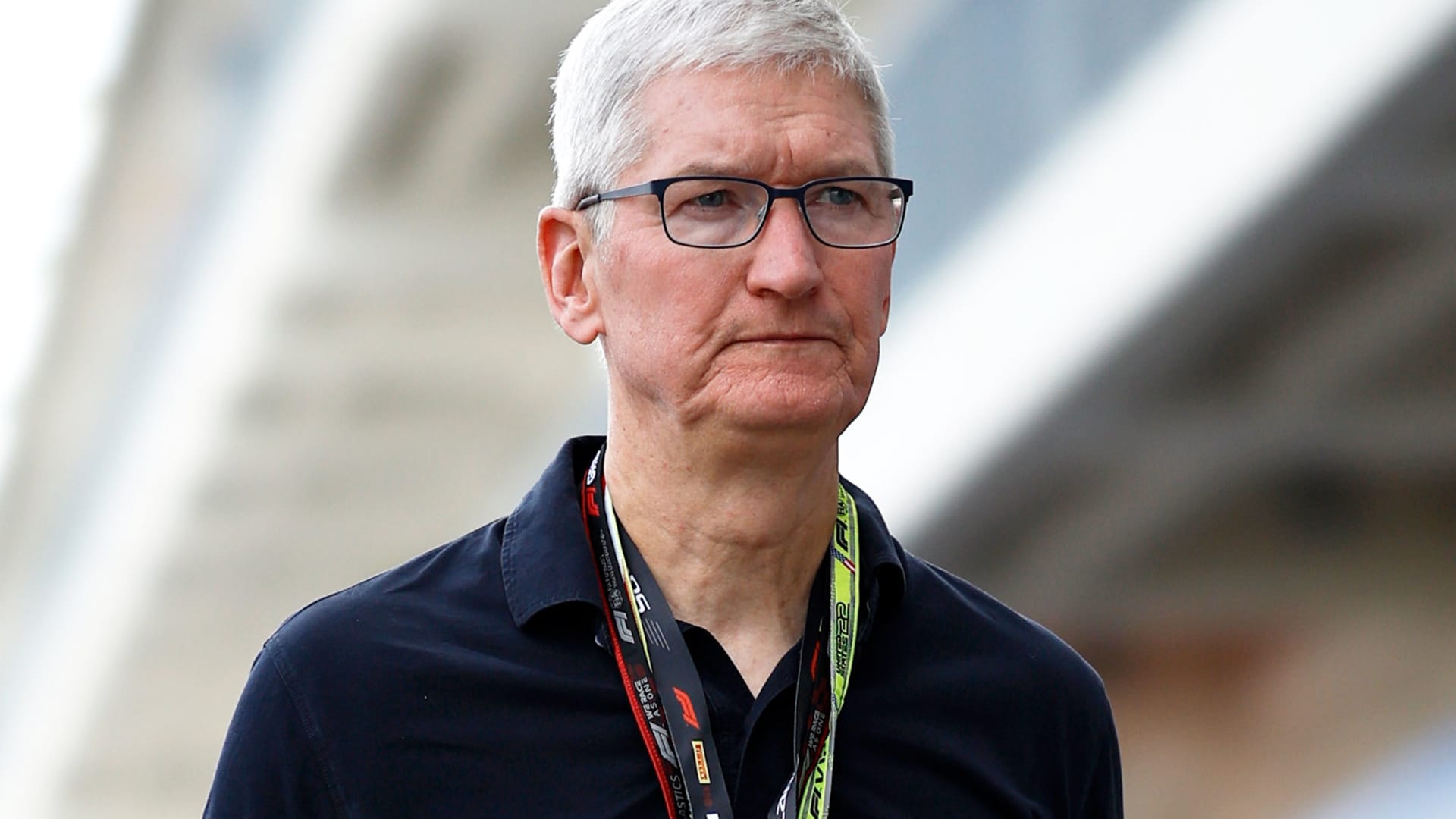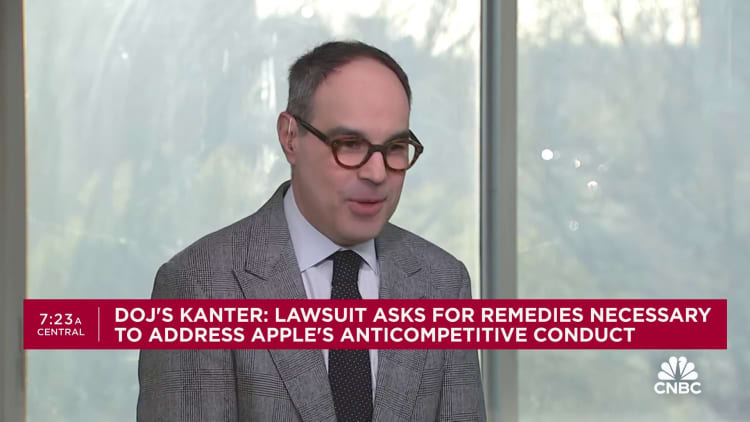

Apple CEO, Tim Cook, testifies before the Senate Homeland Security and Governmental Affairs Committee’s Investigati
Getty Images
The U.S. Department of Justice sued Apple on Thursday, accusing it of using the iPhone’s market power to cut off rivals, kicking off a multiyear process involving hundreds of lawyers and threatening Apple’s “walled garden” business model.
If the DOJ wins, it could seek a range of changes to Apple’s business, and U.S. officials didn’t rule out the possibility that Apple could face “structural remedies” or be broken up.
If Apple’s arguments prevail, a court could rule that its estimated 64% of U.S. smartphone share isn’t a monopoly, or that its conduct wasn’t illegal, giving Apple new tools to fight off future regulation.
But before any of that happens, we’ll likely see years of legal wrangling, during which Apple will be forced to defend its business in public, distract its executives with legal meetings, produce internal documents for the government and potentially face bad headlines that could hurt its brand or image.
The DOJ’s lawsuit still needs to be assigned to a judge. In the short term, Apple could ask for a change of trial location away from New Jersey, and it will likely ask to dismiss the case entirely.
All these steps take varying amounts of time, and it’s realistic the trial will be scheduled for 2025, and the appeal won’t wrap up until 2027, depending on which judge is assigned the case, said William Kovacic, director of the Competition Law Center at George Washington University.
Often, companies accused of antitrust violations like Apple like to drag out the trial, said John Newman, a professor of law at the University of Miami and a former DOJ attorney.
“In general, defendants love to drag their heels forever,” Newman said. “Is the judge going to go with what the defendant proposes, which is inevitably years and years, tons and tons of discovery? Drag it out forever? Or they can actually step up and try to control that?” he continued.
For example, Google was sued by the DOJ in a similar case in October 2020, and it took nearly three years before it went to trial. Remedies haven’t been decided and it hasn’t gone through appeals. The DOJ case against Apple was inspired by a historic case against Microsoft filed in 1998. It went to trial later that year and an appeal was decided by 2001.
A potential distraction
Like the Microsoft trial, the Justice Department lawsuit against Apple is attempting to erect a new landmark decision for antitrust in the U.S., mostly by focusing on Apple’s entire ecosystem, not just a product, and whether how it functions represents anti-competitive conduct.
In a statement provided to CNBC on Thursday, Apple said that the lawsuit “threatens who we are” and that it could hurt its ability to make competitive tech products.
Apple provides more details about why it doesn’t like this kind of litigation in its SEC filings. The company says that when laws and regulations change, including antitrust litigation, it has to spend money to comply. “Imposed” changes can hurt customer demand, according to the filing, and when laws or regulations change, it creates uncertainty for Apple.
Another challenge for Apple may be that a big, public trial like this one competes for executive time and attention, and more decisions inside Apple may have to go through legal review before going forward.
Companies facing antitrust cases often need to loop employees who have nothing to do with trials into meetings, to sort through company documents, or help guide how the company will present evidence or technical arguments, Kovacic, a former FTC commissioner, said.
“In past major antitrust cases, the real danger for the company is that the focus of attention becomes winning the antitrust lawsuits instead of winning customers and doing your job,” Kovacic said. “It slows you down. It’s a real drag.”
For Apple, it’s not just the DOJ suit, but also new regulations in Europe, and investigations in other countries around the world that it has to deal with.
The U.S. government hasn’t said what it wants Apple to do to fix its allegations, but its initial filing on Thursday left the matter open, with a broad request for overall remedy.
One possibility includes forcing Apple to open the iPhone to third-party stores like it has in Europe. Many of the DOJ’s other allegations, like Apple’s alleged restrictions on third-party smartwatches and “super apps” don’t have close recent parallels in other countries or markets. The DOJ could also find remedies that aim to reorient the entire technology industry or future products.
“If and when this thing gets to trial, I would expect that it will not just be about smartphones, even though that’s the core of the story. This is really a case about the future of smart devices,” Newman said.
Apple may, as it has in the past, choose to preemptively make changes or tweaks to targeted products to head off additional scrutiny. For example, in January, Apple partially opened its App Store to cloud gaming services, one of the key kinds of competitors that the Justice Department alleged that Apple cuts off.
Discovery and deposition
Government lawyers will request internal, confidential Apple documents to bolster their case in a process called discovery. Apple’s business partners may also get requests to show the government their own confidential documents. Generally, companies fear discovery, because it’s unclear what will turn up, and Apple is particularly secretive about its internal documentation and strategy.
Documents unearthed through discovery are often posted publicly during the trial, exposing private deliberations.
The government will likely move to depose Apple’s executives, including CEO Tim Cook, or even call them to the witness stand during the trial. Cook took the stand during a recent antitrust trial against Epic Games, for example.
But executive depositions or testimony can still be risky for technology companies, especially if executives cannot control their egos — former Microsoft CEO Bill Gates was famously petulant and showed utter contempt for the process during a videotaped deposition by David Boies in 1998 that was played during the trial.
“A lesson that the Gates deposition experience taught is that if you’re a CEO, there is a real art and skill to doing a good deposition,” Kovacic said. “It requires you to suppress some of your ‘Master of the Universe’ impulses for the sake of doing a good job, and in this case, listening very carefully to the coaching of your lawyers.”
Apple and the DOJ could also come to a settlement, where Apple makes some changes and the government drops the suit before further discovery or depositions. However, there are no public signs of reconciliation.
Apple declined to comment on Thursday when asked if there had been settlement talks.





